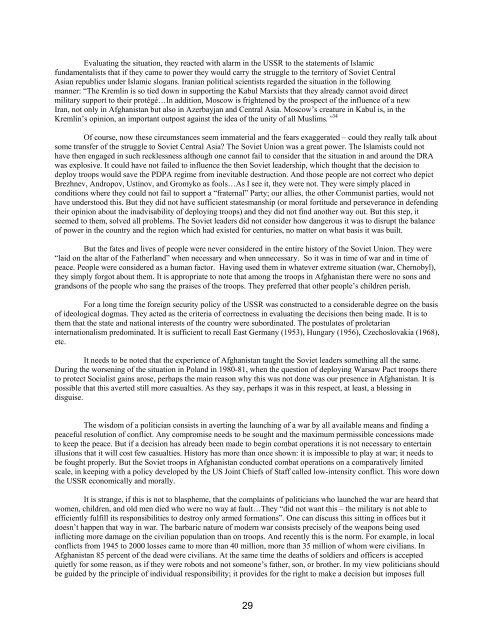Aleksandr Antonovich Lyakhovskiy Working Paper pp - Woodrow ...
Aleksandr Antonovich Lyakhovskiy Working Paper pp - Woodrow ...
Aleksandr Antonovich Lyakhovskiy Working Paper pp - Woodrow ...
Create successful ePaper yourself
Turn your PDF publications into a flip-book with our unique Google optimized e-Paper software.
Evaluating the situation, they reacted with alarm in the USSR to the statements of Islamic<br />
fundamentalists that if they came to power they would carry the struggle to the territory of Soviet Central<br />
Asian republics under Islamic slogans. Iranian political scientists regarded the situation in the following<br />
manner: “The Kremlin is so tied down in su<strong>pp</strong>orting the Kabul Marxists that they already cannot avoid direct<br />
military su<strong>pp</strong>ort to their protégé…In addition, Moscow is frightened by the prospect of the influence of a new<br />
Iran, not only in Afghanistan but also in Azerbayjan and Central Asia. Moscow’s creature in Kabul is, in the<br />
Kremlin’s opinion, an important outpost against the idea of the unity of all Muslims.” 34<br />
Of course, now these circumstances seem immaterial and the fears exaggerated – could they really talk about<br />
some transfer of the struggle to Soviet Central Asia The Soviet Union was a great power. The Islamists could not<br />
have then engaged in such recklessness although one cannot fail to consider that the situation in and around the DRA<br />
was explosive. It could have not failed to influence the then Soviet leadership, which thought that the decision to<br />
deploy troops would save the PDPA regime from inevitable destruction. And those people are not correct who depict<br />
Brezhnev, Andropov, Ustinov, and Gromyko as fools…As I see it, they were not. They were simply placed in<br />
conditions where they could not fail to su<strong>pp</strong>ort a “fraternal” Party; our allies, the other Communist parties, would not<br />
have understood this. But they did not have sufficient statesmanship (or moral fortitude and perseverance in defending<br />
their opinion about the inadvisability of deploying troops) and they did not find another way out. But this step, it<br />
seemed to them, solved all problems. The Soviet leaders did not consider how dangerous it was to disrupt the balance<br />
of power in the country and the region which had existed for centuries, no matter on what basis it was built.<br />
But the fates and lives of people were never considered in the entire history of the Soviet Union. They were<br />
“laid on the altar of the Fatherland” when necessary and when unnecessary. So it was in time of war and in time of<br />
peace. People were considered as a human factor. Having used them in whatever extreme situation (war, Chernobyl),<br />
they simply forgot about them. It is a<strong>pp</strong>ropriate to note that among the troops in Afghanistan there were no sons and<br />
grandsons of the people who sang the praises of the troops. They preferred that other people’s children perish.<br />
For a long time the foreign security policy of the USSR was constructed to a considerable degree on the basis<br />
of ideological dogmas. They acted as the criteria of correctness in evaluating the decisions then being made. It is to<br />
them that the state and national interests of the country were subordinated. The postulates of proletarian<br />
internationalism predominated. It is sufficient to recall East Germany (1953), Hungary (1956), Czechoslovakia (1968),<br />
etc.<br />
It needs to be noted that the experience of Afghanistan taught the Soviet leaders something all the same.<br />
During the worsening of the situation in Poland in 1980-81, when the question of deploying Warsaw Pact troops there<br />
to protect Socialist gains arose, perhaps the main reason why this was not done was our presence in Afghanistan. It is<br />
possible that this averted still more casualties. As they say, perhaps it was in this respect, at least, a blessing in<br />
disguise.<br />
The wisdom of a politician consists in averting the launching of a war by all available means and finding a<br />
peaceful resolution of conflict. Any compromise needs to be sought and the maximum permissible concessions made<br />
to keep the peace. But if a decision has already been made to begin combat operations it is not necessary to entertain<br />
illusions that it will cost few casualties. History has more than once shown: it is impossible to play at war; it needs to<br />
be fought properly. But the Soviet troops in Afghanistan conducted combat operations on a comparatively limited<br />
scale, in keeping with a policy developed by the US Joint Chiefs of Staff called low-intensity conflict. This wore down<br />
the USSR economically and morally.<br />
It is strange, if this is not to blaspheme, that the complaints of politicians who launched the war are heard that<br />
women, children, and old men died who were no way at fault…They “did not want this – the military is not able to<br />
efficiently fulfill its responsibilities to destroy only armed formations”. One can discuss this sitting in offices but it<br />
doesn’t ha<strong>pp</strong>en that way in war. The barbaric nature of modern war consists precisely of the weapons being used<br />
inflicting more damage on the civilian population than on troops. And recently this is the norm. For example, in local<br />
conflicts from 1945 to 2000 losses came to more than 40 million, more than 35 million of whom were civilians. In<br />
Afghanistan 85 percent of the dead were civilians. At the same time the deaths of soldiers and officers is accepted<br />
quietly for some reason, as if they were robots and not someone’s father, son, or brother. In my view politicians should<br />
be guided by the principle of individual responsibility; it provides for the right to make a decision but imposes full<br />
29

















